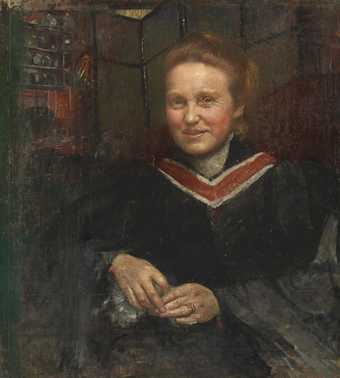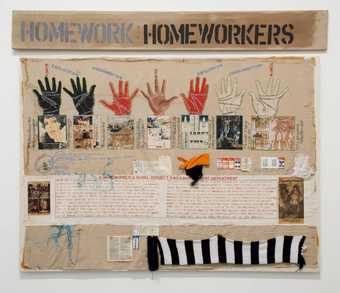
Annie Louisa Swynnerton
Dame Millicent Fawcett, G.B.E., LL.D.
(c.1889–1920)
Tate
Portrait of pioneering suffragist Millicent Fawcett goes on display at Tate Britain
Annie Swynnerton’s portrait of Millicent Fawcett goes on display at Tate Britain today to coincide with the forthcoming centenary on 6 February of the Representation of the People Act which gave women over 30 the right to vote. The painting will then travel to Manchester Art Gallery for their exhibition Annie Swynnerton: Painting Light and Hope opening on 23 February, while a new statue of Fawcett by Gillian Wearing will be unveiled in Parliament Square later this year. The display at Tate Britain is one of many ways Tate is celebrating women in the arts over the coming months.
Maria Balshaw, Director Tate said:
‘The struggles of women to get the basic right to vote were long and arduous. It is hard to believe that it is only one hundred years since that historic victory which set us on course for equal rights. Great strides have been made in the intervening decades but we still have a long road to travel. We are delighted to be marking Millicent Fawcett’s outstanding contribution to the cause with the display of her portrait at Tate Britain. We are also pleased the painting will then travel to Manchester for the Swynnerton exhibition, marking the city’s proud connection with the history of women’s suffrage.’
Swynnerton was a pioneering and successful artist and the first woman to be elected an associate member of the Royal Academy of Arts since its founding. She was a passionate campaigner for women’s right to vote, signed the Declaration in Favour of Women’s Suffrage in July 1889, and headed the Artists’ Suffrage League section of the Women’s Coronation Procession in 1911. She painted several portraits of leading figures in the women’s movement including Dame Millicent Garrett Fawcett (1847-1929), leader of the National Union of Women's Suffrage Societies. Fawcett was instrumental in gaining women the vote in 1918 and was present in parliament for the act that granted all women equal franchise in 1928. After Fawcett died the following year, this painting was exhibited and bought for the nation by the Trustees of the Chantrey Bequest. Dr Katie Jane Tyreman Herrington, co-curator of the forthcoming exhibition at Manchester Art Gallery, suggests it was first painted around 1899 when Fawcett was given an Honorary Doctorate by the University of St Andrews - the subject is shown wearing the university’s robes in the portrait. The painting will be on display at Tate Britain from 2 to 12 February to mark the centenary of the Representation of the People Act on 6 February 1918, before going on loan to Manchester.
Alex Farquharson, Director, Tate Britain said:
‘Swynnerton poignantly captures the qualities of resilience and compassion in her sitter, Millicent Fawcett, revealing the force behind this exceptional woman. We are thrilled to be able to mark the centenary of women’s right to vote with a work by an artist who was an ardent campaigner for women’s rights and whose subject is one of the most important pioneers in the history of women’s suffrage.’
Tate Britain will also explore issues of representation, gender and politics in its collection displays with a series of free tours. These will take place every Monday and Wednesday at 13.15 from 5 February to 27 June and will highlight the experience and vision of women artists in the collection. Visitors can also take a digital tour exploring stories of women’s empowerment across the centuries through works in the collection. A Spotlight display devoted to one of the two women founding members of the Royal Academy, Angelica Kauffman, will open at Tate Britain on 18 June and run until 16 October.
At Tate Modern, this month’s Uniqlo Tate Late on Friday 23 February will also be a celebration of women in the arts. NTS will present an all-female line up of DJs for the Terrace Bar, while gal-dem, a creative collective of women of colour, will curate a night of music in the Tanks. There will also be talks by Frances Morris, Director of Tate Modern, Otegha Uwagba of Women Who, and Sarah Corbett of Craftist Collective, as well as a salon produced by Bishi’s WITCiH (Women in Technology Creative Industries Hub). Stance Podcast will be in residence in Tate Exchange, and further workshops and events around the building will be hosted by South London Women Artists, the Women’s Art Library, Sisters Uncut and the Feminist Library. To highlight the UK gender pay gap, currently recognised as 9.1%, all exhibition tickets will be discounted by 9.1% for the duration of the night.
Frances Morris, Director, Tate Modern said:
‘This is a time to look back and celebrate women’s achievements over the past 100 years, but it’s also a time to look at what women are achieving all over the world today. At this month’s Uniqlo Tate Late, Tate Modern will showcase the amazing things women artists, musicians, writers, thinkers and creatives are doing here and now, as well as taking a critical look at the myriad challenges women continue to encounter in very different circumstances across the globe.’
Tate St Ives will open Virginia Woolf: An Exhibition Inspired by Her Writings on 10 February. Author of classic novels including To the Lighthouse and the pioneering feminist text A Room of One’s Own, Woolf spent much of her childhood in St Ives. This exhibition will use her writing as a prism through which to explore feminist perspectives on landscape, domesticity and identity in art, with works by over 80 artists including Laura Knight, Vanessa Bell, Sandra Blow and Dora Carrington.
At Tate Liverpool a ten-week course for the public on painting inspired by women artists will run until 19 April.

